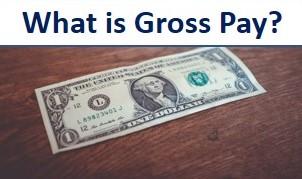Gross pay is the employee’s income before any pension or salary sacrifice deduction. It is different from Taxable pay. It may include salary (annual rate), wages (hourly rate), bonuses or reimbursements (if any), vacation pay, holiday pay, or commissions.

Table of Contents
Gross Pay Meaning
Gross pay also called gross income, is the individual’s total pay from his or her employer before any taxes and deductions. It is not limited to income received in cash; it also includes property or services received. All calculations for employee pay, for instance, over time, withholding, and deductions are based on it.
Components
Gross income includes following components:
- Wages (hourly rate) and salaries (annual rate) and Bonuses (if any)
- Shift differentials and Commissions
- Piece rate pay/ Sick pay
- Vacation pay/Holiday pay
Examples
- A business has sales of €1,000,000, cost of goods sold of €400,000, and selling expenses of €300,000. Its gross income is €600,000 and its net income is €300,000.
- A person earns wages of €1,000, and pay €200 tax. His gross income is €1,000 and his net income is €800.
- Assume that Mike earns an annual income of €50,000 from his financial management consultancy work, €60,000 from his real estate properties, €20,000 in dividends from shares he owns at Company XYZ, and €1,000 in interest income from his savings account. Mike’s gross income is as follows:
Gross Income = 50,000 + 60,000 + 20,000 + 1,000 = €131,000
Gross Pay Definition
Few versions of gross pay definition and key points are listed below:
- It is defined as the amount of income before any deductions or contributions are subtracted from the total earnings.
- It is the total amount of money an employee receives before taxes and deductions are taken out.
- Gross annual income and gross monthly income will always be larger than your net income.
- Gross income for an individual is the individual’s total pay from his or her employer before taxes or other deductions.
- Gross income for a business includes the gross revenue of the firm less cost of goods sold, but it does not include all of the other costs involved in running the business.
Taxable income
Taxable pay is employee’s gross pay less any contributions employee make to a:
- Pension scheme
- Permanent Health Benefit (Income Continuance) scheme
- Salary Sacrifice Arrangement
- Personal Retirement Savings Account (PRSA)
- Retirement Annuity Contract (RAC).

What is Net Income?
Net income is the profit earned by a business or individual after subtracting all expenses.
For an individual, net income is the income earned after paying all taxes, for instance, state and federal taxes, social security taxes, health insurance, etc.
For businesses, It is calculated by subtracting all the business expenses such as taxes, advertising costs, and interest expenses, plus any eligible deductions like professional and legal fees.

Net income (also total comprehensive income, net earnings, net profit, bottom line, sales profit, or credit sales) is an entity’s income less the cost of goods sold, costs, depreciation and amortization, interest, and taxes for a given accounting period.
What Is Money?
Money is such a medium of exchange that is considered a suitable method of payment by both buyer and seller. It is used for buying goods or services. Some well-known mediums of exchange are coins, notes, and credit cards. In the modern world, most money today is in the form of cheques, drafts, and bank credits.
Calculating Gross Pay for Hourly Employees
- Calculate the number of hours worked during the pay period.
- Take into account any absences or other causes for irregular hours.
- Multiply the number of hours worked by the hourly pay rate.
- In case if there is overtime, make sure to include the overtime hours in the gross pay.
- Do not add benefits that may be taxable to the employee’s income.
- For example, the gross pay of an individual who worked 10 hours at the rate of $12 per hour, would be $120.
What Cannot be Included in Gross Income?
Gross income includes, but is not limited to, the following listed types of income [Reference].
- Taxes
- Insurance
- Retirement contributions
- Rental income
- interest income
- Dividends
- Capital gain dividends
- Constructive dividends
- Alimony
- Property settlements income
- Pension and other qualified retirement plan distributions
- A life insurance payment
What can be Included In Gross Income?
- Base salary or hourly wages
- Overtime
- Commissions
- Bonuses
- Reimbursements for such things as employee meals and lodging
- Pay received for vacation time or sick leave
- Tips
Summary
- Gross pay or gross income is the amount of salary or wages paid to the individual by an employer before any taxes and deductions.
- Taxable income is the amount of gross income after subtracting deductions.
- Net income is the profit earned by a business or individual after all deductions have been taken from gross pay, such as payroll taxes, garnishments, and retirement plan contributions.
Frequently Asked Questions (FAQs)
1. What is money laundering?
Money laundering is the process of concealing the origins of illegal money by passing it through a complex sequence of banking transactions.
2. What is smurfing?
Many criminals participate in an activity called smurfing.
Smurfing involves dividing cash gained through illegal activities and giving the funds to different people (the Smurfs).
Smurfs proceeds to make multiple deposits into multiple accounts at different banks.
3. What is gross pay meaning in simple words?
Gross pay meaning refers to the amount of money that an individual earns throughout a given period of time before any deductions are made.
4. Are gross pay and basic pay the same?
Gross pay and basic pay are not the same. The basic wage is the amount agreed upon between a company and its employee, excluding bonuses, overtime, or other forms of additional remuneration.
On the other hand, a gross salary includes overtime pay and bonuses but excludes taxes and other deductions.
5. Can you have negative gross pay?
Gross income can be negative when due to an overpayment of gross pay in a previous pay period, employers may need to lower an employee’s gross pay.
Calculate working hours by assessing the number of hours put in during the period. Also, consider any absences or other causes for irregular hours.
Determine the pay rate by assessing the amount of money earned during the period. Also, include any additional income such as overtime.
Multiply hours worked by the amount earned.
Determine the amount of money earned annually.
Determine the pay structure by determining how the company’s pay structure works. For instance, some are either weekly, bi-weekly, or semi-monthly.
Divide salary by the number of the pay period
Bottom Line
This article covers the concept of gross pay. We hope that this post enables you to differentiate between gross pay, taxable pay, and net pay. If you have any questions please free to post a comment.
Author
Umair Javed
Umair has been working at Whatsinsight since 2020 as a content writer.
He has a Masters degree in Material Science.
More Interesting Topics
- BCl3 Lewis Structure in four simple steps - November 1, 2023
- PH3 Lewis Structure in four simple steps - October 8, 2023
- PF3 Lewis structure in four simple steps - September 24, 2023



